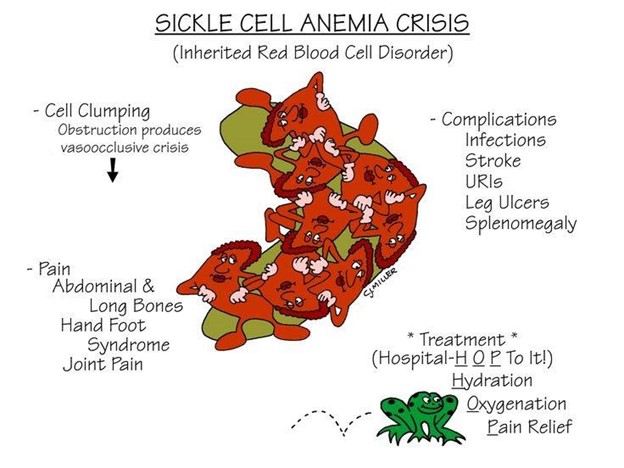A nurse is assessing a child who is in a sickle cell crisis. Which of the following findings should the nurse expect?
Constipation
Pain
High fever
Bradycardia
The Correct Answer is B
During a sickle cell crisis, the child experiences severe pain due to the sickled red blood cells blocking blood flow in the vessels, leading to tissue ischemia and infarction. Pain is the hallmark symptom of sickle cell crisis and can occur in various parts of the body, such as the abdomen, chest, back, joints, and extremities.

A. Constipation is not a common symptom of sickle cell crisis. It may be associated with other conditions but is not directly related to sickle cell crisis.
C. High fever is not a typical finding in sickle cell crisis. Fever may occur due to infections, which individuals with sickle cell disease are at increased risk of developing, but it is not a direct symptom of the crisis itself.
D. Bradycardia (slow heart rate) is not commonly associated with sickle cell crisis. Tachycardia (rapid heart rate) may occur in response to pain, but bradycardia is not a typical finding.
Nursing Test Bank
Naxlex Comprehensive Predictor Exams
Related Questions
Correct Answer is D
Explanation
In cystic fibrosis, the pancreas does not secrete enough digestive enzymes, leading to malabsorption of nutrients, especially fats. To help with digestion, pancreatic enzymes are prescribed to be taken with meals and snacks. These enzymes should be given just before or with each meal or snack to aid in the breakdown and absorption of nutrients.
Correct Answer is C
Explanation
In an infant with a history of vomiting and fever, body weight is the most reliable indicator of fluid loss. Monitoring the infant's weight over time can help assess the degree of dehydration and guide the appropriate fluid replacement therapy. A significant decrease in body weight suggests significant fluid loss.
Option A: Skin integrity is important to assess for signs of dehydration, but it is not as reliable as body weight in determining the extent of fluid loss.
Option B: Respiratory rate can be affected by various factors and is not a direct indicator of fluid loss.
Option D: Blood pressure is not the most reliable indicator of fluid loss in an infant with dehydration. In severe cases of dehydration, blood pressure can drop, but it is not as sensitive as body weight in assessing the extent of fluid loss.
Whether you are a student looking to ace your exams or a practicing nurse seeking to enhance your expertise , our nursing education contents will empower you with the confidence and competence to make a difference in the lives of patients and become a respected leader in the healthcare field.
Visit Naxlex, invest in your future and unlock endless possibilities with our unparalleled nursing education contents today
Report Wrong Answer on the Current Question
Do you disagree with the answer? If yes, what is your expected answer? Explain.
Kindly be descriptive with the issue you are facing.
